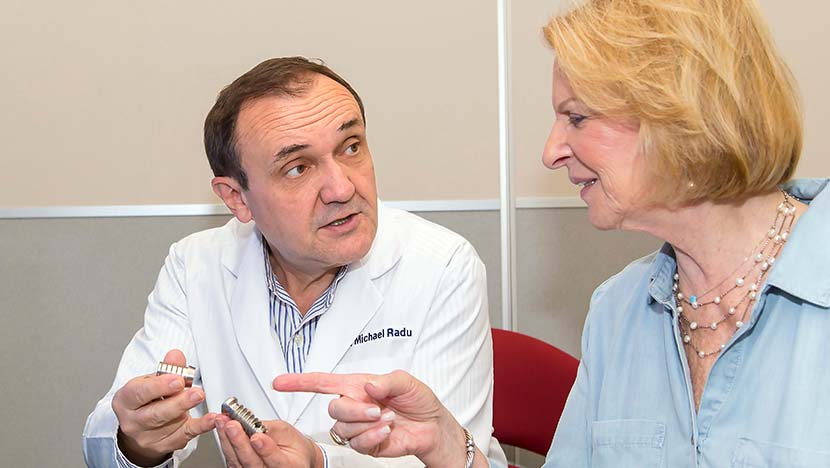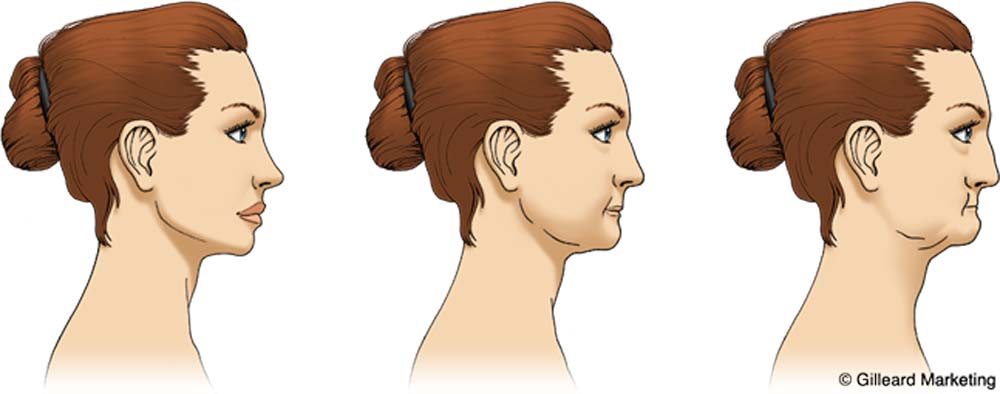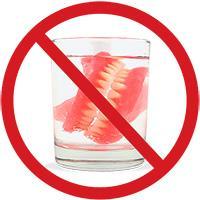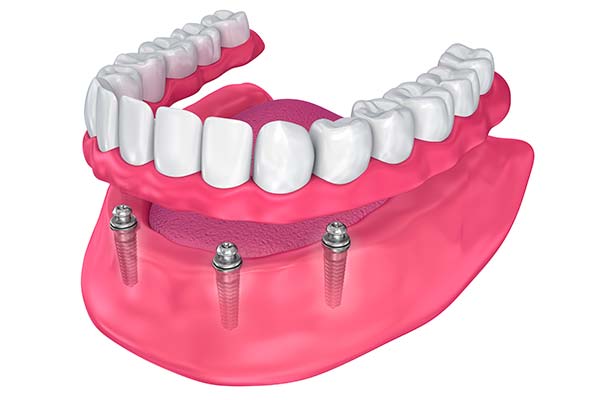Benefits of Dental Implants

Dental implants have many advantages over other methods of teeth replacement. Our doctors can explain these to you in a free dental implant consultation.
Dental Implants Can Last a Lifetime
Our dental implants are made from titanium—a long-lasting, biocompatible metal—and they can last a lifetime with proper care.
Dental Implants Behave Like Natural Teeth
At the conclusion of your implant treatment, your new prosthetic teeth will feel, look and act just like natural teeth. Your will have full chewing power restored so you can eat as you normally would. You can also brush and floss in the usual manner.

Dental Implants Keep Adjacent Teeth Stable
The gap caused by a missing tooth can destabilize adjacent teeth, causing them to shift towards the gap. This pulls your teeth out of position and can affect your bite and your ability to chew. A poor bite can also lead to problems with your jaw joint and may cause headaches and other health issues.
Dental Implants Prevent Bone Loss
Bone in the jaw deteriorates where there is no tooth present. This is because the bone requires the pressure of full-force chewing to maintain its density. In the first year of tooth loss, if no implant is placed, the bone under the empty tooth socket loses 25% of its volume and continues to progress over the years. Dentures can even accelerate bone loss as they are often loose and rub against the bony ridge, gradually wearing it away. Implants act like natural teeth and provide full-force chewing stimulation. This is also true for implant-supported bridges or implant-supported dentures.
Dental Implants Can Prevent Facial Sagging and Premature Aging
Dental implants can also prevent facial sagging for people who have all or many of their teeth missing. Due to progressive bone loss caused by missing teeth, the height between the tip of the nose and chin decreases, causing the lower third of the face to appear to collapse. Changes include excess wrinkles around the mouth, drooping jowls, sagging skin, thinning lips and a more pointed chin, all making the person look a lot older than their true age.

Dental Implants vs. Dentures
Stable Teeth with Good Chewing Power!
One of the most frustrating and most unhealthy aspects of traditional denturesis their poor chewing power. Not only does this affect a person’s diet, it also leads to bone loss due to lack of stimulation. Implants provide near-to-full chewing power and promote jawbone health.
If you are considering traditional dentures versus an implant-supported restoration, here are some additional points to consider:

- Dentures often have to be kept in the mouth by using a dental adhesive. Implants eliminate the need for dental adhesive.
- Dentures have to be removed for cleaning. With the exception of a removable implant-retained denture, normal brushing and flossing can clean your implant-supported new teeth.
- Upper dentures have a false palate that covers the roof of the mouth. With implants, there’s nothing covering the roof of your mouth to interfere with your sense of taste or other normal activities.
- Dentures can slip while eating or speaking. Implants and implant-supported dentures are securely anchored and won’t slip.
- It’s hard to enjoy many foods with dentures. Dentures can move while you chew and make it uncomfortable to try to chew many foods you like or need to stay healthy. In fact, dentures generally give only around 10% of full chewing power. Implant-supported teeth generate much higher and more lifelike chewing power.
- Dentures click while eating. With implants or implant-supported dentures, there’s no annoying clicking sound.
- The progressive bone loss that occurs as a result of wearing dentures can considerably age a person’s facial appearance. Over the years, bone loss can cause the collapse of the lower third of your face, creating excessive wrinkles, sagging skin and jowls, thinning lips and a sunken-in look. Implants help prevent this.
Dental Implants Offer Options
For a patients needing all of their teeth extracted, or who are tired of wearing dentures, the doctors provide several teeth replacement options using implants:
Removable Implant-Supported Dentures
The patient’s own or newly fabricated denture is fitted with special attachments that allow them to snap onto two to eight implants per arch. This type of denture can be easily removed for hygiene and just as easily snapped back in. Removable, implant-supported dentures provide enhanced stability and increased chewing ability.

Dentures can be supported with dental implants to retain bone structure and give you the most stable denture experience
Dr. Radu’s Stable Teeth TodayTM Procedure for Maximum Support
Stable Teeth Today permanently attaches a full arch of teeth onto five or more dental implants and cannot be removed except by a dentist. Fixed, implant-supported full arch restorations provide about 70% to 80% of normal chewing power—the more implants placed, the more chewing power a person has.
Learn more about Stable Teeth Today.
Implant-Supported Bridges
For some people, an implant-supported series of bridges is a superior option. This allows pressure to be distributed throughout the bridges, reducing the amount of pressure on each individual implant. Implant-supported bridges are very natural looking and provide a patient with chewing power over 90%.
Dental Implants vs. Traditional Dental Bridges
The main disadvantage of a traditional dental bridge is that the adjacent healthy teeth have to be ground down considerably as part of the procedure. A dental implant is the most conservative tooth replacement method as it doesn’t require any alteration to adjacent teeth. Bridges tend to have short lifespans—five to ten years—while a dental implant, with proper care, can last a lifetime.
Call 561-220-0454 or click here to schedule your appointment.

With a dental bridge, the patient’s healthy teeth need to be altered to hold the bridge in place.



